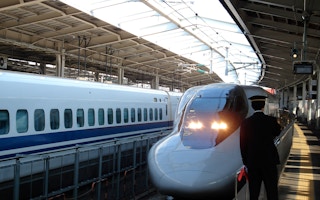Aviation is under increasing pressure to decarbonise as passenger numbers could increase from 2 billion in 2021 to over 10 billion by 2050, according to the International Air Transport Association (IATA), the sector’s industry body.
IATA member airlines have pledged to reach net-zero emissions by mid-century by using sustainable aviation fuels (SAF) - which produce lower CO2 emissions than traditional kerosene - alongside carbon offsets, carbon capture and other new technologies.
In a statement, IATA said airlines are investing in more efficient planes and sustainable fuels, which are included in the calculation of fares.
However, Debbie Hopkins, a professor of human geography at the University of Oxford, said many airlines’ plans depend on technologies that are early-stage or do not exist yet - and sustainable fuels are unlikely to reach sufficient scale to bring emissions down in time to meet climate goals.
How much more expensive are trains?
According to the new Greenpeace report, which analysed costs for 112 different routes on nine different days, 79 journeys were cheaper by plane.
The biggest difference in price was Barcelona to London. In one case, it cost 384 euros ($428) to book a train ticket leaving within a week - nearly 30 times more expensive than the 13 euro ($14.50) equivalent plane trip.
Many cheaper rail options included long waits between connections, the report said.
A similar report published in March by consumer group Which? found it cost a third more on average to travel by train than by plane on routes within Britain - even before new government cuts to domestic air passenger duties in April.
Why are flights often cheaper than train tickets?
“There’s an unfair taxing system which makes trains more expensive,” said Herwig Schuster, a transport campaigner at Greenpeace who authored the ticket prices report.
“There are a lot of polluting subsidies on the airline side.”
The research said many countries charge railways value-added taxes (VAT), energy taxes and high tolls while exempting plane tickets from VAT and not taxing kerosene fuel.
Some airlines have also tried to reduce ticket prices by cutting staff costs, including holding down workers’ salaries and using freelancers instead of employed staff, the report said.
“Highlighting the disparity in fares between airlines and trains in Europe and calling for more taxes on aviation misses the point,” said IATA in a statement.
It said sustainability was a separate issue to the success of making air travel accessible to people on lower incomes.
“To help the sector in its net-zero transition, the EU and its member states should focus on incentivizing SAF production and improving air traffic management … which could reduce CO2 emissions by 10 per cent overnight,” it added.
Schuster said differences in prices were also caused by a lack of competition in railways and insufficient collaboration between companies, as passengers often have to buy several different tickets for international train journeys.
What are countries doing to make trains more popular?
Countries including Germany, Austria and Hungary have started to introduce “climate tickets” which offer affordable train travel in order to encourage people to the railway.
In Germany, a nationwide train and bus ticket was introduced this year for 49 euros ($55) a month.
It follows Berlin’s temporary nine-euro monthly ticket last summer, which the German transport companies’ association VDV said had prevented 1.8 million tonnes of CO2 emissions in the three months it was available.
France recently banned short-haul flights between cities within two-and-a-half hours of each other by train - but this only applies to three routes from Paris.
Schuster said railway companies need to work together more closely, especially across borders, and governments should prioritise rail infrastructure over building highways.
“If you ban a short-haul flight, of course the alternative has to be there,” he said.
“It’s important to make rail a good competitor.”
This story was published with permission from Thomson Reuters Foundation, the charitable arm of Thomson Reuters, that covers humanitarian news, climate change, resilience, women’s rights, trafficking and property rights. Visit https://www.context.news/.










